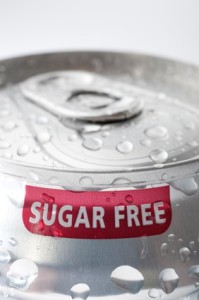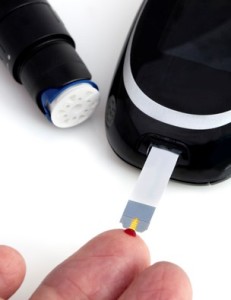Another Myth Bites The Dust
Author: Dr. Stephen Chaney
 Artificial sweeteners and diabetes; is there a relationship?
Artificial sweeteners and diabetes; is there a relationship?
Once again, artificial sweeteners have come up empty. They were supposed to help you lose weight, but several recent clinical studies have suggested that artificially sweetened beverages are just as likely to lead to weight gain as sugar sweetened beverages, see Do Diet Sodas Make You Fat.
What about type 2 diabetes? There have been several clinical trials that have suggested that excess consumption of sugar sweetened beverages may increase your risk of developing type 2 diabetes (For example, Basu et al, Am J Pub Health, 103: 2071-2077, 2013; Malik et al, Diabetes Care, 33: 2477-2483, 2010).
As a consequence if you are at risk of developing type 2 diabetes, you’ve probably been advised by your doctor or dietitian to switch from sugar sweetened beverages to artificially sweetened beverages or natural fruit juices. But, does that really work? Maybe not.
In fact, some studies have suggested that excess consumption of artificially sweetened beverages or fruit juice may be just as likely to lead to type 2 diabetes as consuming sugar sweetened beverages (For example, Greenwood et al, Br J Nutr, 112: 725-734, 2014; Xi et al, PloS One, 9:e93471, 2014).
A Systematic Study Of Beverage Consumption And Diabetes Risk
However, this has been a very controversial topic. The problem is that it is devilishly difficult to design studies that provide definitive answers to these important questions.
To start with there are problems with confounding factors. For example,
- It is pretty well established that consumption of sugar sweetened beverages leads to obesity and obesity leads to type 2 diabetes, but many of the studies did not adjust the data for obesity.
- In addition, many people who are overweight often switch to artificially sweetened beverages in the mistaken belief that they will help them lose weight. Once again, many of the published studies did not correct for that.
There are also problems with study design. For example, many of the studies did not directly compare sugar sweetened and artificially sweetened beverages in the same population group. If the population groups are different enough between studies, it can be a little like trying to compare apples to oranges.
Because of these limitations an international team of experts designed a major systematic review and meta-analysis (Imamura et al, Br J Med, doi: 101136/bmj.h3576, 2015) of all reasonably well designed prospective studies that measured the effect of beverage consumption on the development of type 2 diabetes over time.
They evaluated the data from 17 studies that represented 38,253 people who developed type 2 diabetes over a period of at least two years. They used the most rigorous statistical analysis methods available, and they interpreted their results very cautiously.
In short, this was a major study. So, what did the study show?
Is There a Relationship Between Artificial Sweeteners And Diabetes?
On face value, the data appeared to be fairly clear:
 An additional one serving per day of a sugar-sweetened beverage increases your risk of developing type 2 diabetes by 18%. When you correct for obesity, the increased risk is 13%. (Note: we are talking about an 8 ounce serving here, not a 32 ounce Big Gulp or 64 ounce Double Gulp).
An additional one serving per day of a sugar-sweetened beverage increases your risk of developing type 2 diabetes by 18%. When you correct for obesity, the increased risk is 13%. (Note: we are talking about an 8 ounce serving here, not a 32 ounce Big Gulp or 64 ounce Double Gulp).
- An additional one serving per day of an artificially-sweetened beverage increases your risk of developing type 2 diabetes by 25%. When you correct for obesity, the increased risk is 8%.
- An additional one serving per day of fruit juice increases your risk of developing type 2 diabetes by 5%. When you correct for obesity, the risk actually increases to 7%.
In short, if you want to decrease your risk of developing type 2 diabetes, none of these options is a particularly good choice.
How Were These Data Interpreted
Of course, the strength of any meta-analysis is limited by the quality of the studies that were included in the meta-analysis. It is the old GIGO (garbage in, garbage out) principle. The authors acknowledged that limitation and analyzed in great detail the quality of the individual studies included in their meta-analysis. Their conclusions were as follows:
 The quality of the data on sugar sweetened beverages was strong enough that they could conclude that “habitual consumption of sugar sweetened beverages is associated with a greater incidence of type 2 diabetes, independent of obesity”. In short, you want to stay away from sugar sweetened beverages. They can cause obesity AND they can cause type 2 diabetes.
The quality of the data on sugar sweetened beverages was strong enough that they could conclude that “habitual consumption of sugar sweetened beverages is associated with a greater incidence of type 2 diabetes, independent of obesity”. In short, you want to stay away from sugar sweetened beverages. They can cause obesity AND they can cause type 2 diabetes.
- They also said that “…artificially sweetened beverages and fruit juice also showed positive associations with incidence of type 2 diabetes”, but did not feel the existing data were strong enough to make a definitive conclusion. They felt that more studies are needed.
- However, they did feel that the existing data were strong enough to conclude that “neither artificially sweetened beverages nor fruit juice are suitable alternatives to sugar sweetened beverages for the preventing of type 2 diabetes.” In short, consumption of artificially sweetened beverages and fruit juice may not cause type 2 diabetes, but they clearly don’t prevent it.
The Bottom Line
If you are overweight or otherwise at risk of developing type 2 diabetes, you have probably been advised to switch from sugar-sweetened beverages to either artificially sweetened beverages or fruit juices. A major study has just turned that advice on its head!
This study (Imamura et al, Br J Med, doi: 101136/bmj.h3576, 2015) was a systematic review and meta-analysis of 17 previously published clinical studies that measured the effect of beverage consumption on the development of type 2 diabetes over time. Based on a very careful analysis of the data from this meta-analysis the authors concluded:
- The quality of the data on sugar sweetened beverages was strong enough that they could unequivocally state that “habitual consumption of sugar sweetened beverages is associated with a greater incidence of type 2 diabetes, independent of obesity”. In short, you want to stay away from sugar sweetened beverages. They can cause obesity AND they can cause type 2 diabetes.
- They also said that “…artificially sweetened beverages and fruit juice also showed positive associations with incidence of type 2 diabetes”, but did not feel the existing data were strong enough to make a definitive conclusion. They felt that more studies are needed.
- However, they did feel that the existing data were strong enough to conclude that “neither artificially sweetened beverages nor fruit juice are suitable alternatives to sugar sweetened beverages for the preventing of type 2 diabetes.” In short, consumption of artificially sweetened beverages and fruit juice may not cause type 2 diabetes, but they clearly don’t prevent it.
So what kind of beverages should you consume if you don’t want your beverage intake to contribute to type 2 diabetes?
- Water is always the first choice.
- Milk, protein shakes and similar beverages can also be an excellent choice as long as you take the calories into account. The protein content of those beverages generally slows the rate of sugar uptake. Look for products with a low glycemic index.
- High intensity or long endurance exercise requires a lot of carbohydrate, so sugars in rehydration or recovery sports supplements are well tolerated. However, those same sports drinks would be a concern if used as part of a sedentary lifestyle.
- Finally, tea, coffee, and non-caffeinated herbal teas are excellent choices as long as you learn to enjoy them without adding sugar or artificial sweeteners.
These statements have not been evaluated by the Food and Drug Administration. This information is not intended to diagnose, treat, cure or prevent any disease.
